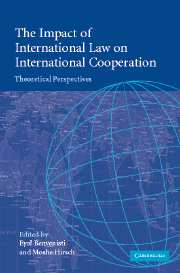Book contents
- Frontmatter
- Contents
- List of contributors
- Acknowledgments
- List of abbreviations
- 1 Introduction
- 2 International law and international relations theory: a prospectus
- 3 Pathways to international cooperation
- 4 Customary international law as a judicial tool for promoting efficiency
- 5 Reputation, compliance and development
- 6 Rethinking compliance with international law
- 7 Compliance with international norms in the age of globalization: two theoretical perspectives
- 8 Compliance and non-compliance with international norms in territorial disputes: the Latin American record of arbitrations
- 9 International trade and domestic politics: the domestic sources of international trade agreements and institutions
- 10 Human rights, developing countries and the WTO constraint: the very thing that makes you rich makes me poor?
- 11 Back to court after Shrimp–Turtle: India's challenge to labor and environmental linkages in the EC generalized system of preferences
- Index
5 - Reputation, compliance and development
Published online by Cambridge University Press: 06 July 2009
- Frontmatter
- Contents
- List of contributors
- Acknowledgments
- List of abbreviations
- 1 Introduction
- 2 International law and international relations theory: a prospectus
- 3 Pathways to international cooperation
- 4 Customary international law as a judicial tool for promoting efficiency
- 5 Reputation, compliance and development
- 6 Rethinking compliance with international law
- 7 Compliance with international norms in the age of globalization: two theoretical perspectives
- 8 Compliance and non-compliance with international norms in territorial disputes: the Latin American record of arbitrations
- 9 International trade and domestic politics: the domestic sources of international trade agreements and institutions
- 10 Human rights, developing countries and the WTO constraint: the very thing that makes you rich makes me poor?
- 11 Back to court after Shrimp–Turtle: India's challenge to labor and environmental linkages in the EC generalized system of preferences
- Index
Summary
Introduction
Many international relations and international legal theorists believe that the concern a state has for its reputation as a reliable treaty partner provides the key to understanding the evolution of multilateral cooperation in the international system. Even in situations with considerable incentives to defect and unavailable reciprocal and institutional sanctions, the prospect of exclusion from future agreements and/or having participation in current agreements discounted suffices to insure compliance.
These theorists tend to find the process by which reputation operates to promote compliance normatively attractive as well. It is considered less coercive than either reciprocal or institutional sanctions, and requires far lower transaction costs than more institutionalized alternatives, such as a multilateral organization's dispute resolution process. Perhaps most importantly, reputational recalibration promises to operate more democratically than other enforcement mechanisms. While large developed states may be politically insulated from institutional sanctions by the multilateral organizations that they dominate and may be invulnerable economically to reciprocal sanctions from weaker developing states, they cannot so easily escape the consequences of their own reputations. Yet despite these attractive features, reputation is more often viewed as an enemy than as a friend of developing states. In general, developing states have poorer compliance records than developed states – records that may well worsen before they improve, as multilateral agreements promise to proliferate more quickly than developing state economies improve.
- Type
- Chapter
- Information
- The Impact of International Law on International CooperationTheoretical Perspectives, pp. 117 - 133Publisher: Cambridge University PressPrint publication year: 2004
- 1
- Cited by

